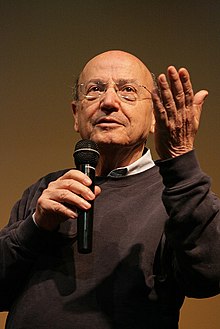Theodoros Angelopoulos
| Theo Angelopoulos | |
|---|---|

Angelopoulos presenting his film The Dust of Time in 2009 in Athens, Greece
|
|
| Born |
Theodoros Angelopoulos 27 April 1935 Athens, Greece |
| Died | 24 January 2012 (aged 76) Piraeus, Greece |
| Cause of death | Traffic collision |
| Occupation | Film director and screenwriter |
| Years active | 1965–2012 |
| Spouse(s) | Phoebe Economopoulou (1980–2012; his death) |
| Children | Anna Angelopoulou, Katerina Angelopoulou and Eleni Angelopoulou |
| Website | Official website |
Theodoros "Theo" Angelopoulos (Greek: Θεόδωρος Αγγελόπουλος) (27 April 1935 – 24 January 2012) was a Greek filmmaker, screenwriter and film producer.
An acclaimed and multi-awarded film director who dominated the Greek art film industry from 1975 on, Angelopoulos was one of the most influential and widely respected filmmakers in the world. He started making films in 1967. In the 1970s he made a series of political films about modern Greece.
Angelopoulos' work, described by Martin Scorsese as that of "a masterful filmmaker", is characterized by slightest movement, slightest change in distance, long takes, and complex yet carefully composed scenes; his cinematic method, as a result, is often described as "sweeping" and "hypnotic."
In 1998 his film Eternity and a Day went on to win the prestigious Palme d'Or at the 51st edition of the Cannes Film Festival, and his films have been shown at many of the world's most esteemed film festivals. In 2000 he was the President of the Jury at the 22nd Moscow International Film Festival. The life of Theo Angelopoulos, his work, and his passion were the subject of a documentary directed in 2008 by Elodie Lelu.
Theodoros Angelopoulos was born in Athens on 27 April 1935. During the Greek Civil War, his father was taken hostage and returned when Angelopoulos was 9 years old; according to the director, the absence of his father and looking for him among the dead bodies had a great impact on his cinematography. He studied law at the National and Kapodistrian University of Athens, but after his military service went to Paris to attend the Sorbonne. He soon dropped out to study film at the Institut des hautes études cinématographiques (IDHEC) before returning to Greece. There, he worked as a journalist and film critic. Angelopoulos began making films after the 1967 coup that began the Greek military dictatorship known as the Regime of the Colonels. He made his first short film in 1968 and in the 1970s he began making a series of political feature films about modern Greece: Days of '36 (Meres Tou 36, 1972), The Travelling Players (O Thiassos, 1975) and The Hunters (I Kynighoi, 1977). In 1978, he was a member of the jury at the 28th Berlin International Film Festival.
...
Wikipedia
